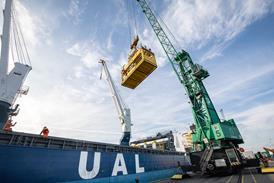February 11 - According to Drewry's quarterly report Carrier Performance Insight, just published, ship-level and container-level Key Performance Indicators (KPIs) showed significant quarter-on-quarter increases in reliability in the fourth quarter of 2012
Containership reliability reached a new record high in the fourth quarter of 2012 with the percentage of on-time ship arrivals across all trades increasing to 79.9 percent, a rise of 6.4 percentage points on the third quarter performance.
The new ship reliability record eclipses the previous best of 75.7 percent set in the second quarter of 2012.
The latest on-time score also means that the on-time percentage stayed in the 70-80 percent range for the whole of 2012, whereas previously it had not gone above 69 percent in any quarter since Drewry started measuring ship reliability at the end of 2005.
Hanjin Shipping usurped Maersk Line as the most reliable major carrier (defined as having a minimum of 100 voyage counts in a quarter) with an all-trades on-time average of 90.2 percent in the fourth quarter.
As to be expect from related KPIs, just as there was a rise in ship-level reliability in the fourth quarter, container-level data showed similar gain with all four main container KPIs improving by at least two percentage points in the fourth quarter. Most significantly, the 'On-Time Shipment of Cargo' KPI which measures the timeliness of a container being loaded on to the ship improved by 6 percentage points to 75 percent.
Delays at the box loading stage of the supply chain will inevitably have a knock-on effect and while an overall improvement was seen in the fourth quarter it is highly probable that the average will come down in the first quarter as cancelled sailings play havoc with operations.
"While carriers deserve some plaudits for their improving reliability, a worrying trend for cancelled or blank voyages is emerging as carriers attempt to redress weak supply and demand fundamentals," said Simon Heaney, research manager at Drewry.
Drewry is hearing of shippers building in specific clauses into contracts to alleviate the potential disruption of missed sailings by committing volumes against actual services rather than a carrier, as is standard practice.
Blank voyages are making life tougher for shippers, who already have to contend with the looming threat of strike action at US East and Gulf Coast ports.
Blank sailings fall outside of the parameters of Drewry's ship reliability measurement as to be included requires a completed voyage. Heaney said that Drewry will continue to monitor the situation and report its findings in the next issue of Carrier Performance Insight.
www.drewry.co.uk
















